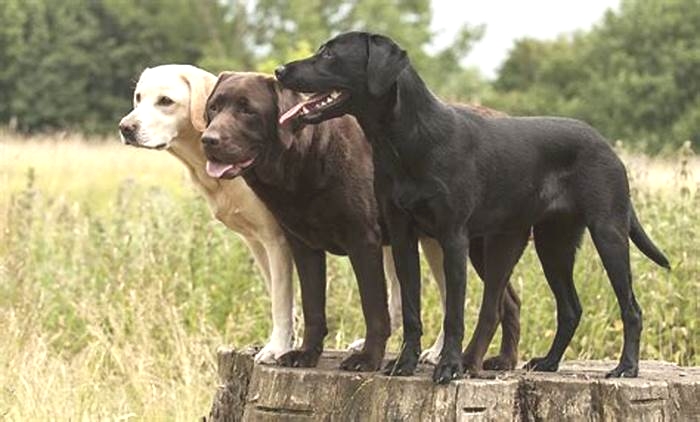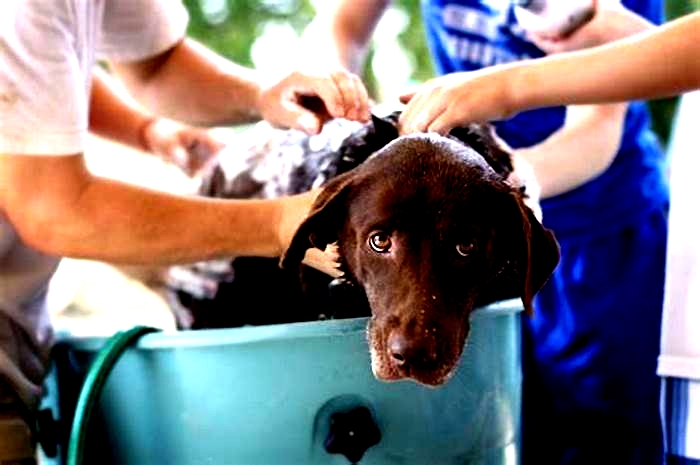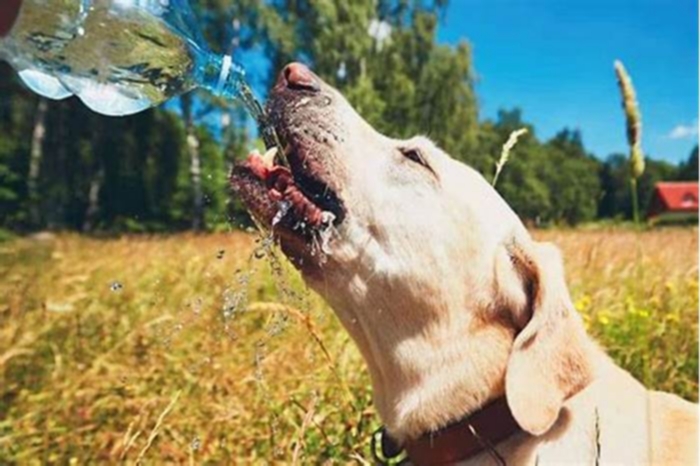Why are labs always panting
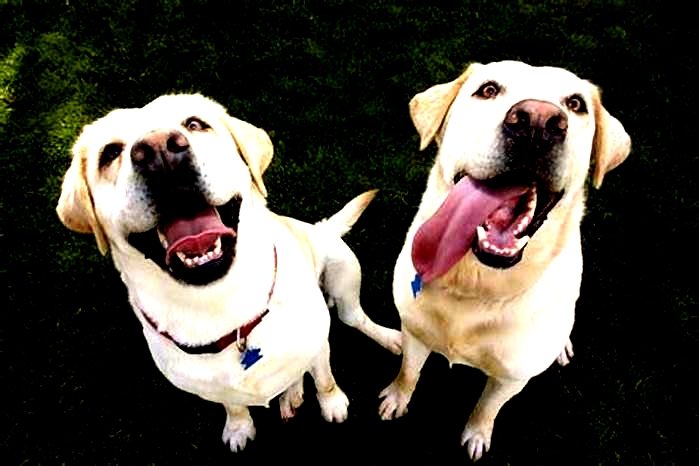
Is Your Labrador Panting Too Much? (Comprehensive Guide)

Does it seem like yourLabrador pants a lotmore than other dogs? This is quite normal due to thebreeds traitsandhigh energy levels.
Our comprehensive guide will delve intowhy Labs pant,when you should be concerned, andhow to address excessive panting.
Ready for a healthier, happier pooch? Lets dive in!
Why does my Lab pant so much?
Labs pant so much for a few reasons, like staying cool or being a bit anxious. Its their way of regulating body temperature and expressing emotions. But if it seems excessive, its always a good idea to check in with your vet to make sure everythings okay! Lets take a closer look at the following lines.
1) Regulation of body temperature
Labradors have an innate mechanism to regulate their body temperature they pant. Labradors rely on the process ofpantingfor heat regulation.
By rapidly breathing in and out, your furry friend dissipates heat through theevaporation of moisturefrom their tongue and upper respiratory tract. This cooling effect helps maintain astable internal temperaturedespiteexternal conditionsorphysical exertion.
When your Lab is panting, they can lose a lot of water quickly, so its crucial to ensure they have access to plenty of fresh water, especially on warm days.
So next time you see your Labrador panting after a game of fetch or on a sunny day, dont worry, its just theirnatural air conditioning systemat work!
2) Exercise and exertion
One of the main reasons why Labradors pant heavily is due toexercise and exertion. These active and energetic dogs love to run, play fetch, and engage in vigorous activities that can quicklyraise their body temperature.
When they engage in strenuous exercise or play for an extended period, their bodies heat up, andpanting helps them cool down.
Through panting, Labs canregulate their body temperaturebyincreasing the airflowacross their tongue and respiratory system. This triggersevaporative coolingasmoisture from their mouth lining and lungs evaporates during exhalation.
3) Stress and anxiety
Labradors can experiencestress and anxiety. This can lead to panting as their way ofcoping with these emotions.Stress and anxiety in Labradorscan betriggered by various factorssuch as loud noises, changes in routine, being left alone for long periods, or even visiting the veterinarian.
When Labradors are stressed or anxious, they may exhibitexcessive pantingas a sign of their discomfort. Dog owners need to recognize and address theseunderlying causes of stress and anxietyto help reduce their Lab panting episodes.
To help your Labrador feel less stressed and anxious, create a peaceful space and keep them busy with toys or puzzles. Also, consider using calming scents or vet-recommended supplements to soothe them.
4) Pain or discomfort
One possible reason why your Lab may pant excessively is due topain or discomfort. Labrador pants as a way to regulate their body temperature. If your Lab is experiencing pain or discomfort, it can trigger increased panting.
Pain can be caused by various factors such asinjuries, infections, or internal issues. Its important to monitor your dog forsigns of distresslike limping, whining, or changes in behavior.
Some medications may also lead to heavy panting in dogs. Check with your vet if you think your Lab medication is causing heavy panting.
When Panting Becomes a Concern?
Excessive panting, labored breathing, and accompanying symptoms shouldnt be ignored. If your Labrador is showing signs of abnormal panting, its crucial to understand the underlying reasons and take appropriate action.
1) Excessive panting
Excessive panting in Labradorscan be a cause for concern and may indicate an underlying issue that needs to be addressed. While panting is normal for dogs to regulate their body temperature, excessive panting could signify something more serious.
Its important to monitor your Lab breathing patterns and look out for any signs of labored breathing or other accompanying symptoms.
There are several reasons why your Labrador might be excessively panting. One common cause is heat and humidity, especially during the summer months when dogs are more prone to overheating. Other potential factors include anxiety or stress, which can trigger increased respiratory rates in dogs.
Pain or discomfort from injuries or health conditions like infections or fever can also contribute to excessive panting.
If you notice that your dog is excessively panting without any apparent reason, its essential to take action. Ensure they have access to a cool and comfortable environment with proper ventilation and shade.
Make sure they always have fresh water available to stay hydrated. Managing stress and anxiety through techniques like regular exercise, mental stimulation, and comforting routines can also help reduce excessive panting in Labradors.
The excessive panting persists or if you observe additional concerning symptoms such as lethargy, vomiting, loss of appetite, or pale gums alongside the heavy breathing, its crucial to seek veterinary attention immediately.
Excessive dog panting could be a sign of an underlying health issue that requires professional diagnosis and treatment.
2) Labored breathing
Labored breathing in Labradors can be asign of a more serious issue. When your Labradors panting heavily and their breath seems forced or labored, it may indicate anunderlying health problem.
Some possible causes include heart disease, respiratory infections, allergies, or even certain types of cancers. Its important to monitor your dog closely and look for otheraccompanying symptoms such as coughing, wheezing, lethargy, or blue gums.
If you notice any concerning signs along with labored breathing, its crucial toseek veterinary attention promptlyto ensure the well-being of your beloved furry friend.
3) Other accompanying symptoms
Excessive panting in Labradors can sometimes be accompanied by other symptoms that may indicate a more serious issue.
Symptoms likelabored breathing,rapid heartbeat,coughing,wheezing,excessive drooling,pale gums,weakness or collapse, and changes in appetite or behavior.
It is important to pay attention to these signs as they could indicate underlying health problems such as heatstroke, respiratory infections, heart disease, or even pain and discomfort.
If you notice any of these accompanying symptoms along with excessive panting in your Labrador, it is crucial to seek veterinary attention promptly for a proper diagnosis and treatment.
Early detection and intervention can greatly improve the chances of a positive outcome for your beloved pets health and well-being.
What to Do if Your Lab Is Panting Heavily?

To address excessive panting, make sure your Labrador has a cool and comfortable environment, provides plenty of water, manages stress and anxiety, and seeks veterinary attention for underlying health issues.
1) Ensure a cool and comfortable environment
To help alleviate excessive panting, its important to ensure acool and comfortable environmentfor your furry friend.
Make sure your dog hasaccess to shade and fresh air, whether indoors or outdoors. If youre outside on a hot day, consider providing acooling mat or damp towelfor them to lie on. Inside the house, keep the temperature regulated with fans or air conditioning.
Make sure there is proper ventilation in their sleeping area and avoid confining them in stuffy spaces. By creating a cool and comfortable environment, you can help reduce your Labradors panting and improve their overall well-being.
2) Provide plenty of water
To help addressexcessive pantingin your Labrador, it is crucial to provide them with plenty of water. Dogs regulate their body temperature through panting, andadequate hydrationplays a significant role in this process.
Make sure that your Labrador always has access tofresh, clean waterthroughout the day. This will help them stay properly hydrated, especially duringhot weatheror afterphysical exertion.
Keeping water readily available for your furry friend can greatly contribute to their overall comfort and well-being.
3) Manage stress and anxiety
Its important to address these emotions in your furry friend to ensure their overall well-being.
One way to manage stress and anxiety in Labradors is by providing acalm and secure environmentfor them. This means creating a safe space where they feel comfortable, whether its a designated area or a cozy bed with familiar scents.
Engaging inregular exercise and playtimecan help reduce stress levels by releasing endorphins and promoting relaxation.
Consider exploringcalming techniquessuch as gentle massages or using natural remedies specifically formulated for dogs that help promote relaxation without any harmful side effects.
4) Seek veterinary attention for underlying health issues
If you notice that your Labrador is panting excessively and it is not related to exercise or heat, its crucial toseek veterinary attentionforunderlying health issues.
Excessive panting in dogs could indicate a range of potential problems such asinfections, fever, pain, or discomfort. A veterinarian will be able to assess your Labradors overall health and determine if there are any underlying medical conditions contributing to theexcessive panting.
Early detection and intervention can help ensure the best possible outcome for your furry friend.
5) Bring your Labrador Retriever to the hospital
If you need to take your Lab to the hospital, keep the air conditioner on in your car. At the hospital, your dog might receive fluids and undergo blood tests to check for any organ damage.
They may also need blood work or X-rays to identify any underlying diseases. Treatment for excessive panting can vary, from administering medication at home to more advanced treatments requiring hospitalization.
Conclusion
Labradors pant for various reasons, including to regulate their body temperature, after exercise or exertion, due tostress and anxiety, or when experiencing pain or discomfort. Excessive pantingcan be a cause for concern.
To address this issue, make sure your dog has a cool and comfortable environment, access to plenty of water, manage any stress or anxiety they may feel, andseek veterinary attentionif there are underlying health issues.
Understanding the causes of panting in Labradors is essential for keeping your furry friend happy and healthy.
FAQ
Why does my Labrador pant so much?
Labradors are known for being active and energetic dogs, which can cause them to pant more frequently than other breeds.
Panting helps regulate their body temperature and cool themselves down, especially after exercise or in hot weather.
Should I be concerned about my Labrador pants excessively?
Excessive panting in Labradors could indicate an underlying health issue such as heatstroke, respiratory problems, or stress.
If you notice your Labrador panting excessively without any obvious reasons or if it is accompanied by other symptoms like lethargy or difficulty breathing, it is best to consult a veterinarian for a thorough evaluation.
How can I help my Labrador when they are panting heavily?
To help your Labrador when they are panting heavily, ensure they have access to fresh water at all times and provide a cool and comfortable environment.
You can also use wet towels or cooling mats specifically designed for dogs to help lower their body temperature. If the excessive panting continues even after implementing these measures, seek veterinary attention.
Are there any preventive measures I can take to reduce excessive panting in my Labrador?
To reduce excessive panting in your Labrador, make sure they have plenty of shade and fresh water available during outdoor activities on hot days.
Avoid exercising them during peak temperatures and opt for cooler times of the day instead. Regular grooming sessions will also help maintain their coats condition and prevent overheating.
Understanding and Managing Excessive Panting in Labradors
Labradors are known for their sweet and friendly demeanor, but they also make great working dogs. One of the most common occurrences in Labradors is excessive panting, and there are many possible reasons for this behavior. And in this guide, well discuss the main reasons for this problem and how to manage it. So without further ado, lets dive in!
How To Know If Panting Is Normal Or A Sign Of Emergency?
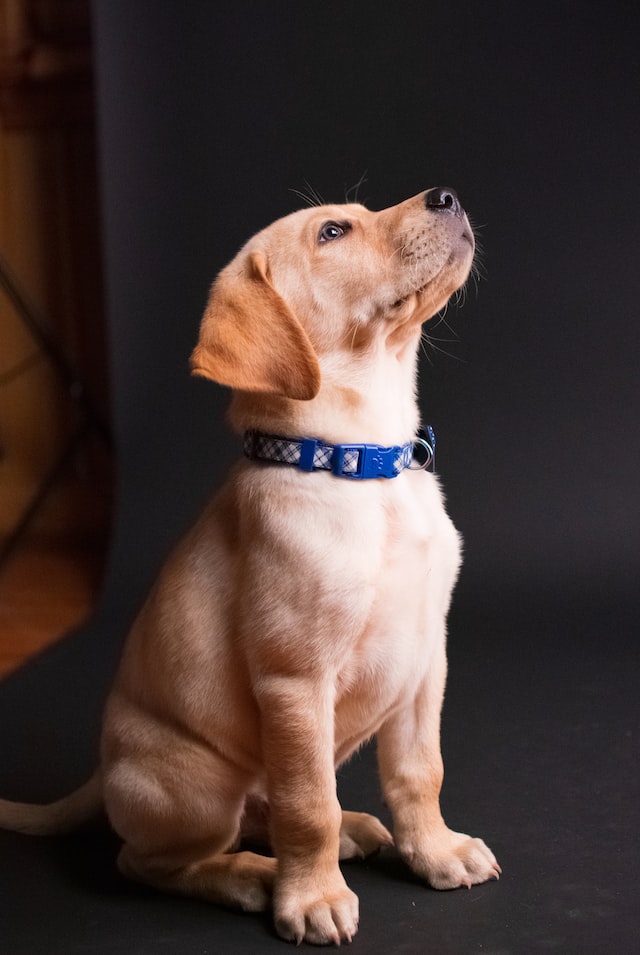
Labradors are known for their heavy panting, but if your dogs panting seems excessive or unusual, it could mean an emergency or underlying medical condition.
If you notice that your Labrador is panting and are concerned about it, there are several things to consider. If the dog is relaxed and sitting or lying down, heavy breathing through its mouth is normal. If the dog is standing up, however, its breathing should not be labored or rapid.
If theres something wrong with your Labradors breathing pattern after a slight movement, there could be a problem with its health. And knowing the possible reasons for this will help you quickly determine how to address it.
Reasons Why Labradors Are Panting
Despite their popularity, Labrador retrievers are not perfect. Like all dogs, they can get sick and have health issues. They also pant for various reasons:
Temperature
If its summer, your Labrador may pant when hes hot. This can happen even if it doesnt seem like the air is very warm. The ground absorbs the suns heat, which then heats up the air above it. Even when you dont feel hot, your dogs paws could be burning on a hot day!
If winter has come around again and all that snow has melted away into puddles, your Lab will probably be cool enough without having to worry about his paws getting too cold while he plays outside.
Physical Activity
Labradors are known to pant often, as they are working dogs. If your dog is panting but seems otherwise okay, dont worry about it too much. Youre Lab might just have a tiring day due to massive physical activity!
Anxiety or Stress
When your Lab starts to pant, it may be a sign that hes feeling stressed or anxious. Dogs can get stressed by loud noises, unfamiliar people, or other dogs. Panting is one way they regulate their body temperature when theyre feeling nervous.
Hyperventilation
If your dog is breathing rapidly and has an elevated heart rate, he may be experiencing hyperventilation. This reaction happens when your pet feels threatened or scared, or if hes excited (for example, when greeting you after work). If this becomes an issue for your pet, talk with your vet about how best to manage his anxiety levels.
Fear or Excitement
Your dog may pant when he sees you or another person because he is excited to see you. Labradors are very social dogs, so they may be excited to see people! And its possible that your Lab is panting because he wants some exercise or just wants to have some fun!
If your Lab is panting when theres no reason for him to be excited or hot, then there might be something wrong with him physically or emotionally. If this happens regularly (more than once a week), take him in for an exam by his veterinarian right away.
You can also click here to know other reasons for its hyperactivity.
Medical Conditions That Are Associated With Excessive Panting
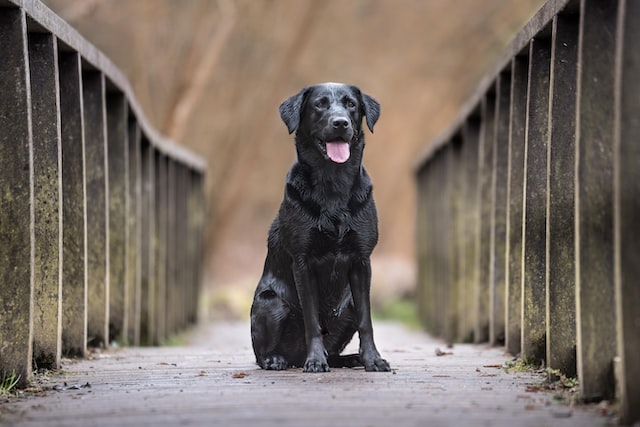
Its so hard to see your Lab panting. That can be a sign of many things, from stress to heat stroke. But it can also be a symptom of a hidden illness that could be life-threatening for your pooch. Here are the possible medical conditions that can cause excessive panting.
Diabetes
Among the symptoms of diabetes in Labradors is excessive panting because of several factors. Diabetes can lead to dehydration and an increase in body temperature, which can cause the dog to pant more in an attempt to cool down. Additionally, diabetes can damage the nerves in the respiratory system, making it harder for the dog to breathe.
Hyperthyroidism
In dogs, hyperthyroidism can cause weight loss, increased appetite, and pant. The reason for this is that excessive production of thyroid hormones causes metabolic changes that result in an increase in body temperature, which requires constant cooling through panting. Additionally, heart and lung problems may also contribute to panting in affected dogs.
Kidney Disease
Labrador retrievers are prone to kidney disease, which can cause excessive panting. Other symptoms include an increased heart rate and abdominal girth, or the area around your dogs midsection. If you notice your dog panting excessively, see your vet for a diagnosis and proper treatment.
Cushings Syndrome
Cushings Syndrome is a disease that causes Labradors to pant excessively. This happens because the disease increases the dogs cortisol levels, which causes it to feel stressed out even when it is not. This can lead to panting as a way to cool down and regulate body temperature. Additionally, Cushings Syndrome can also cause increased thirst and urination, which may also contribute to panting as a way to regulate temperature.
3 Things To Check If Your Labrador Is Panting
Panting is a normal part of a Labradors behavior, but it can also be a sign that somethings wrong. Learn how to recognize the difference and what to do if its time for a trip to the vet!
Check the weather.
If the temperature is too hot for you to stay outside for long periods of time then its probably too hot for your dog as well! If this is the case, bring him inside until it cools down some more before taking him back out again.
Check your Labradors diet.
If your Labrador is panting, its important to check its diet. A Labrador that is eating too much or too fast may be overfed, which can lead to excessive panting. If youre feeding your dog high-quality food, consider cutting back on the amount of food you give them. This prevents them from feeling full all the time that can make them pant more often. If this doesnt help with their panting problem, try switching their diet altogether and see if that helps eliminate some of their symptoms.
Check his activity level.
If your Labrador is panting, the last thing you should do is check his activity level. If hes been resting or sleeping, then its possible that he just needs some time to cool down. More likely than not though, youll see him panting while playing or running around with his friends in the park. If this is the case, then its likely that overheating is causing him to breathe heavily.
If your dog seems like he might be suffering from heatstroke, take him indoors immediately and call a vet for help before administering any kind of treatment yourself.
Tips To Prevent Your Labrador From Panting Excessively
Panting is a normal activity in Labradors, but excessive panting can be a sign of overheating. This is especially true if the dogs tongue is bright red or if it has a high fever. If your Labrador is panting excessively, there are some steps you can take to prevent this condition and keep your pet healthy and happy.
Always provide fresh water
The first thing you need to do is provide your Lab with fresh water. You can do this by making sure that theres always an ample supply of clean drinking water in the house, and you should also keep a bowl outside for when the weather is nice.
Its important that your Labrador has access to clean water at all times, even in winter! Dont worry about them getting dehydrated or overheating when its cold outside. Theyll drink plenty on their own if given the opportunity.
Dress your Labrador appropriately
Keep the Labs ears and tail cool. This can be accomplished by a simple bandana, or you can opt for a more elaborate cooling vest. Then, protect the Labs skin from sunburn by applying sunscreen on hot days and giving your Lab a bath before heading out into the sun for extended periods of time (like when you go camping).
Lastly, use a coat to protect their skin if necessary, especially if you live in an area where there are cold winters or if they spend most of their time outside during warm weather months. This will also help keep them warm at night time because they wont have as much insulation without it!
Provide shade for your Lab
If youre out in the heat and your Labrador is panting heavily, make sure that there is shade available for him or her to rest in. If there isnt any, consider bringing along a portable canopy or umbrella that can provide some relief from the suns rays.
Any dog left in an enclosed vehicle on a hot day can suffer from heatstroke within minutes. So never leave your pooch unattended in a parked car!
Do not over-exercise your Lab
One of the best ways to prevent panting in Labradors is to not over-exercise them. This can be especially important during warmer months when temperatures are higher, or if you live in a hot climate. Excessive panting can actually be detrimental to your Lab and cause dehydration or heat stroke if it continues for too long. So make sure that youre keeping an eye on how much exercise they get each day!
If youre going out for walks with your Labrador Retriever, try taking shorter walks instead of longer ones. This is to ensure that their body doesnt have time to get too tired out from all the activity before returning home again. If possible, try doing some type of exercise indoors where theres air conditioning rather than outdoors. That way, at least it wont feel as hot compared with being outside where everything seems hotter due to direct sunlight exposure alone!
Take the time to acclimate it to exercise and heat.
You should only take your Labrador out for short walks in warm weather, and slowly increase the amount of time you spend walking. If you live in a hot climate, make sure that you never walk your Labradors during the hottest part of the day (between 10 am-2 pm).
If possible, avoid exercising outside on days when temperatures are above 80 degrees Fahrenheit (26 degrees Celsius). If not possible, try moving inside where theres air conditioning or opening windows so that they can benefit from cooler breezes.
Final Words
In conclusion, excessive panting in Labradors can be a symptom of a variety of different conditions. If you notice your Labrador still excessively panting, it is important to consult with your veterinarian to rule out any underlying health issues and ensure your dog receives the proper care and treatment. It is always better to be safe than sorry when it comes to our furry companions. With proper diagnosis and treatment, your Labrador can lead a happy and healthy life!


